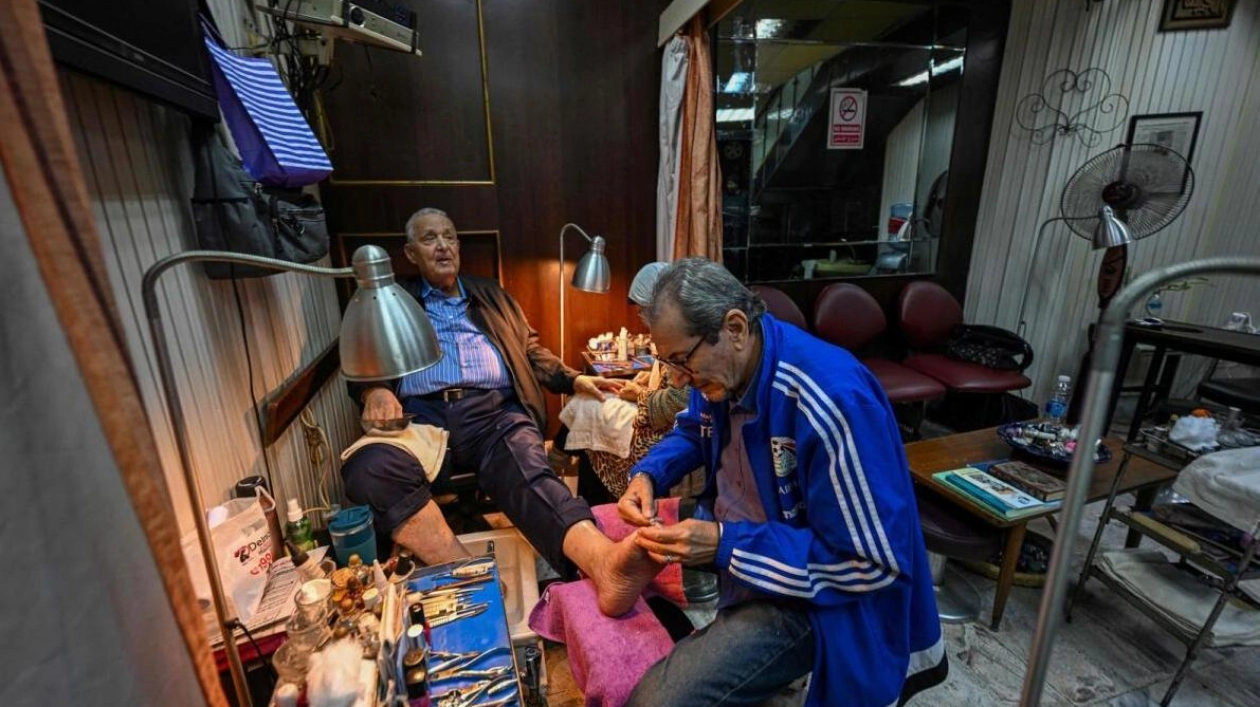Refaat Abdel Hakim, the stepson of Madame Lucie, attends to a client at her manicure shop in downtown Cairo on November 18, 2024. – AFP
Hidden away in a quiet alley off a busy street in the heart of Egypt's capital lies a modest manicure shop with a storied past. Today, Madame Lucie's humble establishment is overshadowed by the contemporary facades of trendy cafes, fashion boutiques, and fast food outlets that have largely replaced Cairo's former glory. However, in its heyday, the shop welcomed luminaries such as Nobel laureate Naguib Mahfouz, international singing icon Dalida, and film star Omar Sharif, all of whom sought the skilled hands of the now 88-year-old manicurist.
For over six decades, Layla Abdel Hakim Mekhtegian—better known as Madame Lucie—has managed her small shop, preserving its rich history. For those who enter this shop, often touted as the oldest manicurist in the country, it's a journey back to Cairo's cosmopolitan era of the 1950s and 60s. 'Everything here remains as it was 64 years ago,' the French-educated Armenian woman told AFP. Established in December 1960, the salon exudes a vintage charm. Outside, the name Lucie greets visitors in old fluorescent signage in both Arabic and French. Inside, antique manicure tables face sepia-toned photographs of past patrons.
'Customers often say, 'Don't change a thing',' she noted. Madame Lucie's client list is a who's who of Egypt's cultural elite. 'Mahfouz would come in for a trim while fans waited outside to get his autograph,' she reminisces with a smile. 'Dalida? Always punctual.' 'Her fans would visit when they heard she was at the salon,' she continues. 'And Omar Sharif,' she adds softly, 'was quiet but so charming.'
Madame Lucie is part of a generation of Armenian entrepreneurs who significantly influenced downtown Cairo's commercial scene in the mid-20th century. Along with her enduring salon, she is one of the few businesses that survived President Gamal Abdel Nasser's nationalization efforts in the 1960s. Before that, Egypt's Armenian community, which peaked at 45,000 in the 1950s, played a vital role in the country's cultural and economic life. Lucie learned her craft at 14 under the tutelage of Marie at Bata, a once-famous department store in Cairo. With her husband Jimmy and a Jewish investor, she converted a printing house in downtown Cairo into her salon. She has steadfastly adhered to traditional nail treatments, avoiding modern trends offered by many nail spas today.
Her services extend beyond aesthetics; many clients seek relief from conditions like calluses, ingrown nails, and dead skin buildup. This has helped her maintain not only the shop's historical significance but also a loyal customer base for nearly as long. 'It's more of a treatment than a cosmetic service,' said Effat Adel, a housewife in her fifties who has been visiting the salon for 37 years. Sabry Ghoneim, an 89-year-old veteran journalist and loyal customer for over four decades, said, 'This place gives me peace of mind.' Despite suggestions to expand, Lucie declines. 'Why would I? This place is home,' she said. 'Every year, I update the sign outside to show how long we've been here. This December, it'll say 65 years.'
Source link: https://www.khaleejtimes.com






